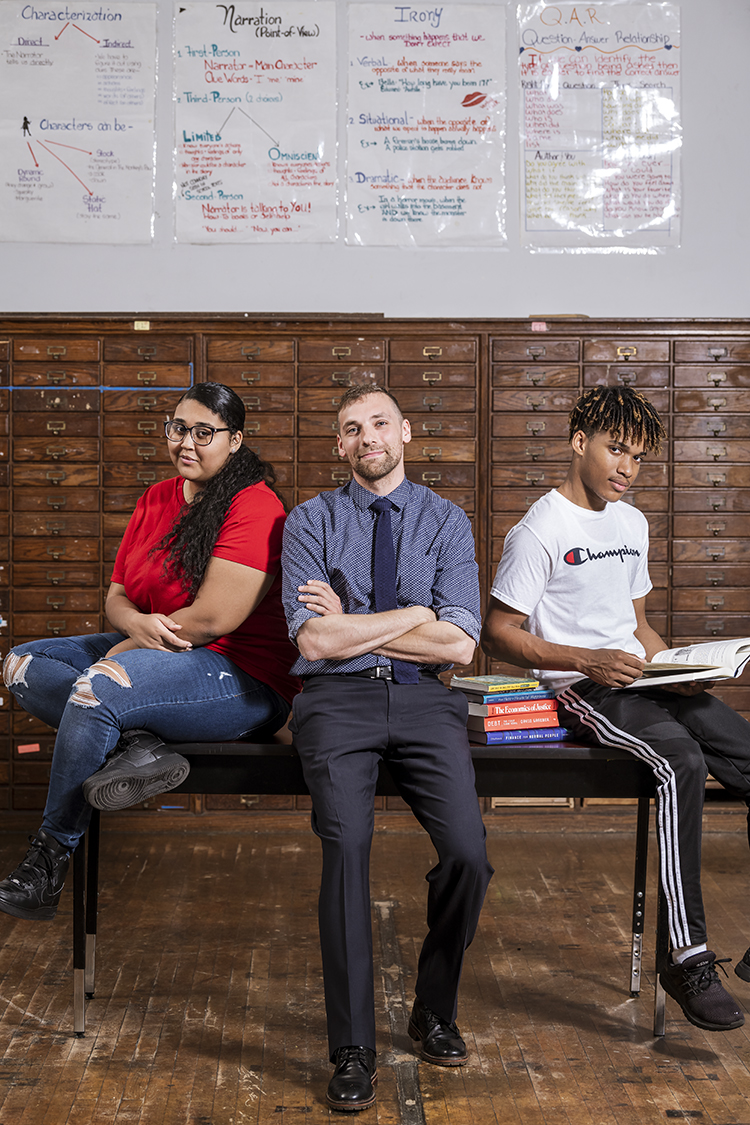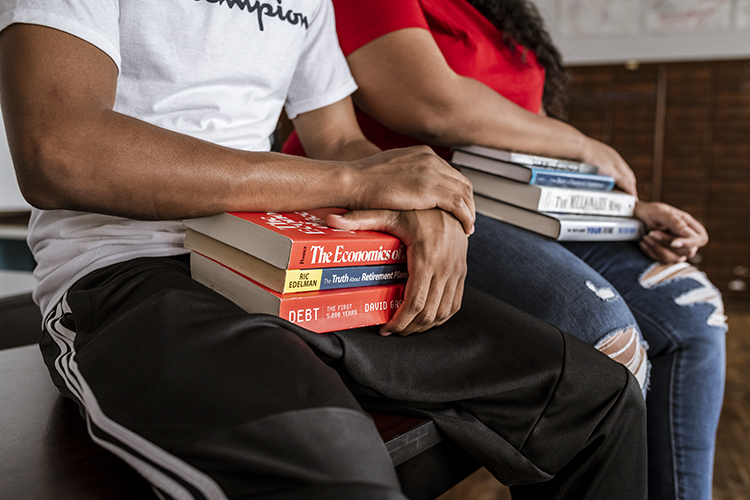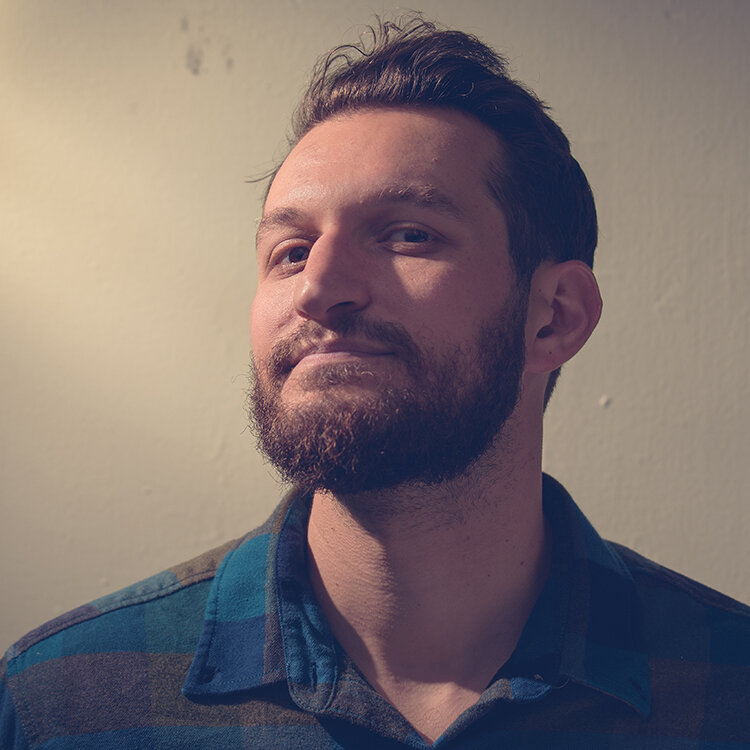

By Alexandra Jones
The teen years are an opportune time to learn smart money habits. High school students are on the verge of making big decisions—choosing colleges and career paths, opening bank accounts and sometimes getting their first cars and credit cards—that may have long-term effects on their lives.
A few fundamental lessons can set them up for success while avoiding common pitfalls—like overspending and racking up credit card debt.
And yet, they are unlikely to receive those lessons in school.
That’s why Dan LaSalle, a teacher at Olney Charter High School, founded the Philly Finance Cooperative, a course that gives students real-world money-management experience, allowing them to earn money and then choose how to spend, save and invest it.
“I saw so many bright students that had graduated and couldn’t understand how to navigate consumer and economic life—the cost of college, apartments, car insurance,” says LaSalle. “If they had a more privileged upbringing, their parents would have bought them [everything], but these students [are] dealing with pricing, costs and people selling them things they didn’t need to buy.”
Three years ago, he started the cooperative with 25 students and $25,000 in grant funds from the Philadelphia Academy of School Leaders.
Getting the program off the ground was a challenge. To open bank accounts for minors, sign-off from an adult is needed. Some parents didn’t have bank accounts of their own, while others were undocumented. Others had poor credit; owed money to a collection agency, cell phone company or utility company; or had a negative bank balance—creating an immediate flag from credit bureaus, thus prohibiting them from opening or co-signing on a new account.
During the first year, over two-thirds of the 25 students had an adult other than a parent cosign for their account. (Now LaSalle collaborates with American Heritage Credit Union, which is more accommodating to students opening accounts with unbanked or underbanked parents.)
Those in the program work jobs like managing after-school clubs and activities, funded by private donors to the program, to earn money.
In the 2018-2019 school year, 81 students earned a combined total of $68,000 in wages. Students can also earn and deposit money from outside jobs.
While most teens—and, who are we kidding, most adults—would benefit from a primer on personal finance, LaSalle’s class is addressing a population that is particularly vulnerable. According to data collected by the Pennsylvania Department of Education, two-thirds of the high school’s 1,984 students are considered economically disadvantaged. Roughly 62 percent of the school’s students are Hispanic and 32 percent, black. U.S. Census data from 2010 indicates that the median incomes of Hispanic and black households in the Philadelphia area were $39,300 and $38,200, respectively. For non-Hispanic whites, the average was $75,000—nearly double.
Pebbles Ladriye, a rising senior at Olney, has been a star student in the class for a year and a half. But at home, “how to save and how to budget doesn’t really come up,” Ladriye says.
Ladriye’s family emigrated from the Dominican Republic when she was 9 years old. Her mother expects that just as she learned to speak English, she will learn money management on her own.
LaSalle says Ladriye now understands personal finance better than most adults. With $800 in the bank, she’s on track to exceed her goal of saving $1,000 this summer while working as an assistant to her mother, a home health aide. And although Ladriye’s not quite sure what she wants to do when she graduates, she’s considering studying finance.
“Everyone wants to get a job that gives you a lot of money, but you should also get one you actually enjoy doing,” she says. “I’ve learned so much through this program that it makes me want to do a job I enjoy.”
A wealth of knowledge
Though he’s a teacher and administrator with a background in cognitive science and psychology—not a financial planner—LaSalle has been saving well and spending strategically for many years: After comparison shopping, he did his first two years of schooling at Community College of Philadelphia before transferring to a four-year university, with much of his tuition paid for with need- and merit-based scholarships.
Scoping out college costs left a lasting impact on him.
“Price doesn’t equal quality,” he says. “I became a skeptical consumer.”
LaSalle put his philosophy into the program’s textbook, Chasing Benjamins: Mr. LaSalle’s Guaranteed Guide to Becoming a Millionaire. With a cheeky title, engaging language, and Bitmoji illustrations, the book serves as a practical, easy-to-understand guide for teens to set themselves up to live, work and retire with financial freedom.
In other words, to self-actualize.
A wealthy person, according to LaSalle, has money to spend on the things she wants, plus money saved and money invested. The five steps to getting there? First, visualize your retirement and your legacy. Do you want to quit working at age 50, to sip piña coladas on the beach, or to leave enough behind so that your grandchildren can go to college debt-free?
Next, find your niche—your way of earning a living and contributing to the world that provides you with the motivation to get up and go to work every day.
Third, live below your means—a no-
brainer that’s nonetheless tough for most people to put into practice.
Fourth, don’t forget to pay yourself first—that is, save 10 to 20 percent of your income.
And finally, invest your money wisely in financial products like mutual funds, exchange-traded funds and index funds that will provide you with a dependable, long-term payoff.
LaSalle hopes that foundational lessons and real-life experience with how to earn, think about and manage money to reach long-term life goals could help break students and their families out of the cycle of generational poverty. With sufficient funding, LaSalle would like to make the program available to every student at Olney Charter.
True profit
To keep students on the right track, LaSalle has monthly one-on-one meetings to discuss how they’ve been spending and saving. While some are natural savers, others spend every penny they earn, promise to change and then don’t follow through. The teacher acknowledges that there’s only so much you can do to ensure a student’s financial success.
“Maybe five years from now, it’ll click, maybe not,” he says.
Take rising senior Bryant Alvarado, who saved up $3,0
00 through the program and an off-campus job to buy a car. Although LaSalle teaches students to eschew credit cards except for emergencies and a few credit-building transactions, Alvarado decided to try one out for himself. Soon, the student had amassed around $1,000 in trivial purchases on his card.
“I learned that a credit card gives you freedom—sometimes a little too much,” Alvarado says. “You have to be responsible, and you can’t use it on everyday expenses because it racks up before you notice it.”
Overall, the class has changed how Alvarado thinks about money.
“Before the class, I just thought money bought you stuff,” he says. “After the class, the same thing—but how you acquire it is different. Making an investment in homes isn’t as effective as the stock market. And having multiple sources of income or securities is a good way to build wealth.”
After graduation, Alvarado is hoping to attend Penn State. He’s also set a savings goal for himself: put away $10,000 to $15,000 in the next few years so that he’ll be in a good position to buy his own place when he strikes out on his own. After that? His dream is to work on Wall Street.
But first, Alvarado says, he’ll start by studying finance. The student plans to work with individuals and businesses on financial planning—helping folks with money grow their wealth and those without to get on the right path to financial freedom.
All thanks to LaSalle’s class.
“It’s helped me a lot,” he says. “It changed my perspective on the world, caused me to think more critically about money and life as a whole, planning ahead—all that good stuff.”



